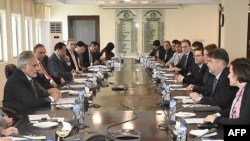Talks between the International Monetary Fund and cash-strapped Pakistan for the release of much-needed funds from a bailout package have ended without any official announcement.
Pakistan’s finance secretary told reporters there were outstanding issues between the two sides that needed to be resolved. He added that the IMF gave Pakistan a list of necessary steps and asked for more time to reach an agreement.
The IMF did not issue a statement on the status of the deal at the end of the negotiations, which ran from January 31 to Thursday.
Pakistan is facing default as its debt is mounting, revenues are shrinking and foreign reserves are critically low.
IMF staff and officials from Pakistan’s finance, petroleum and power ministries and other departments sought a way for the country to receive more than $1 billion from a $6 billion bailout program agreed to in 2019. The size of the package was increased by almost $500 million last year after Pakistan suffered devastating floods.
The talks came after months of delays as the government, like its predecessor, reneged on reform commitments, such as increasing petroleum prices, ending subsidies to reduce the energy sector’s exorbitant debt, and increasing taxes.
Petroleum prices, exchange rate
To bring the IMF back to the negotiating table, Pakistan last month increased petroleum prices to an all-time high and stopped controlling the exchange rate, a measure that sent the rupee tumbling to its lowest value ever against the dollar and drove inflation to 27.6%. That was the highest reading since May 1975.
As negotiations went on, reports emerged of disagreements between the two sides on a variety of issues, including budget deficit data and plans to reduce energy sector debt, limit government expenses and increase revenue, according to media reports.
Pakistan's Prime Minister Shahbaz Sharif warned last week that the government faced IMF bailout conditions that were "beyond imagination."
Pakistan desperately needs the bailout payment as foreign reserves held by the country’s central bank dipped below $3 billion last week, according to its latest report.
While much of Pakistan’s $23 billion in loan repayments due in this fiscal year have been rolled over, the chief of the State Bank of Pakistan told local media in late January that $3 billion must be paid by the end of the fiscal year to avoid default.
The country is also facing a budget shortfall of $10 billion.
Support from the IMF would usher in financial assistance from other multilateral lenders as well as friendly countries that have signaled the need for Pakistan to implement reforms.
From staples like cooking oil and tea to fuel and machinery, Pakistan’s $350 billion economy relies heavily on imports. To save fast-depleting foreign reserves, Pakistani banks did not issue letters of credit to import goods, raw materials or machinery, slowing down economic activity and risking shortages.
Pakistan has participated in 23 loan programs with the IMF since the country became a member in 1950. It has sought a bailout at least 13 times since the 1980s but failed to implement necessary economic reforms.




